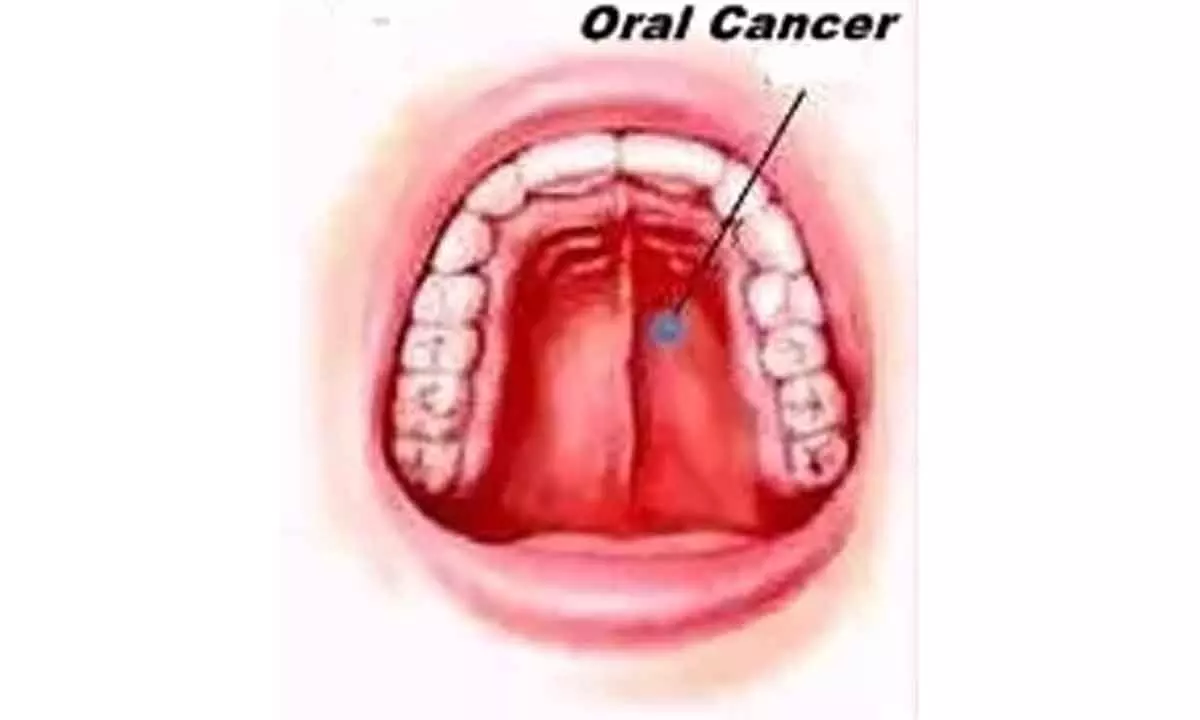Live
- Steps to safeguard natural springs gain momentum
- RWAs want officials to clear fog over SCB-GHMC merger
- Tanks, canals remain neglected despite execution of MGNREGS works
- BRS to celebrate Deeksha Diwas on Nov 29, Dec 9
- NCC Day grandly celebrated at SITAM
- CITU demands rollback of strategic sale of VSP
- 7-Year-old girl sexually assaulted in Tirupati
- PM Modi highlights govt's efforts to make Odisha prosperous and one of the fastest-growing states
- Hezbollah fires 200 rockets at northern, central Israel, injuring eight
- Allu Arjun's Family Appearance on Unstoppable with NBK Breaks Viewership Records
Just In
Smokeless tobacco, betel nut drive oral cancer cases in India, highest in South Asia: Lancet

India has the highest number of oral cancer cases among countries in South Asia, driven by increased use of smokeless tobacco products like betel quid with tobacco, gutka, khaini; and areca nut, according to a study on Wednesday.
New Delhi: India has the highest number of oral cancer cases among countries in South Asia, driven by increased use of smokeless tobacco products like betel quid with tobacco, gutka, khaini; and areca nut, according to a study on Wednesday.
The study led by the International Agency for Research on Cancer (IARC) and published in The Lancet Oncology journal showed that India logged 83,400 of the 120,200 oral cancer cases globally caused by smokeless tobacco (chewed, sucked, inhaled, applied locally, or ingested) and areca nut (seed of the areca palm) in 2022.
The consumption of areca nut (30 per cent) and betel quid with tobacco (28 per cent) were responsible for the most oral cancer cases among women, followed by gutka (21 per cent) and khaini (21 per cent).
Among men, it was khaini (47 per cent), gutka (43 per cent), betel quid with tobacco (33 per cent), and areca nut (32 per cent).
“Smokeless tobacco and areca nut products are available to consumers in many different forms across the world, but consuming smokeless tobacco and areca nut is linked to multiple diseases, including oral cancer,” said Dr Harriet Rumgay, a scientist in the Cancer Surveillance Branch at IARC.
“We found that more than 120,000 people across the world were diagnosed with oral cancer that could have been caused by using smokeless tobacco or areca nut. Our estimates highlight the burden these products pose on health care and the importance of prevention strategies to reduce consumption of smokeless tobacco and areca nuts,” he added.
The IARC study showed that 120,200 of the 389,800 oral cancer cases in 2022 could be caused by smokeless tobacco and areca nut use. This also means that by preventing smokeless tobacco and areca nut use, one-third (31 per cent) of all oral cancer cases could be avoided.
Further, more than 95 per cent of all oral cancer cases caused by smokeless tobacco and areca nut use occurred in low- and middle-income countries (115,900 cases).
India was followed by Bangladesh (9,700), Pakistan (8,900), China (3,200), Myanmar (1,600), Sri Lanka (1,300), Indonesia (990), and Thailand (785).
While "control of tobacco smoking has improved, prevention of smokeless tobacco use has stalled, and areca nut remains largely unregulated,” said Dr. Isabelle Soerjomataram, Deputy Head of the Cancer Surveillance Branch at IARC.
The study called for prioritising smokeless tobacco control, and developing a framework for areca nut prevention which must be integrated into cancer control programmes.

© 2024 Hyderabad Media House Limited/The Hans India. All rights reserved. Powered by hocalwire.com






